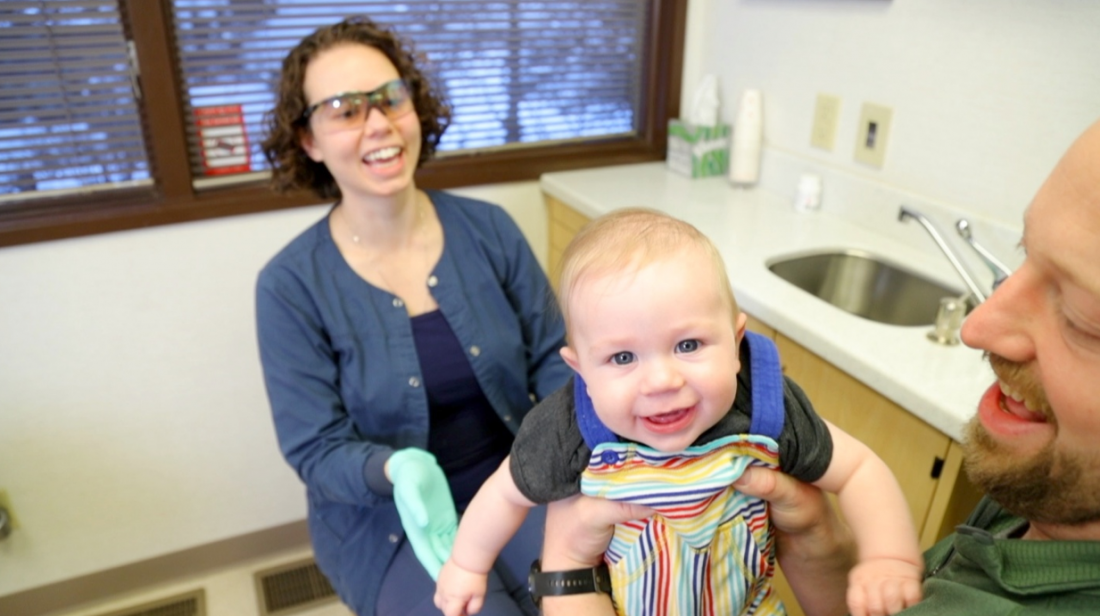Your little one’s first trip to see a pediatric dentist can be nerve-wracking for both of you, but it’s essential to plan for this important milestone.
A bad first experience at the dentist can leave a lasting impression on your child. But did you know that if you plan ahead, you can minimize the dentist-jitters?

While finding an excellent pediatric dentist for kids in Anchorage, Alaska can be a challenge, here are all the tips you need to choose the right dentist and make the first appointment a pleasant one!
Start a Dental Routine Early
Good dental hygiene begins at home, and the earlier a child gets into a dental routine, the easier the first dentist visit will be.
Dental Care at 6 Months
The NHS recommends starting a dental routine as early as when your baby’s first tooth appears – this is usually at around six months. Let your baby get used to having a small soft-bristled brush in her mouth by gently running it over her gums.
To make dental care a positive experience right from the beginning by making a game out of brushing your child’s teeth. You can do this by singing, counting her teeth with her, and using flavored toothpaste.
Dental Care at 12 Months
At the age of 12-18 months, you can start brushing your child’s milk teeth (baby teeth) with fluoride toothpaste – this will help prevent cavities. Use a pea-sized amount of toothpaste to brush your child’s teeth for two minutes, twice a day.
Now is also the time to begin preparing your child for that dreaded first visit to the dentist. Don’t panic. Following the tips below will ensure that this important (and scary) milestone goes smoothly – for you and your little one.
Choosing a Dentist
Most dentists recommend scheduling the first appointment around your child’s first birthday. But before you book an appointment for your little one, there are a few things you need to consider.
Choose a Good Pediatric Dentist
All pediatric dentists are general dentists, but not all general dentists have pediatric training, so resist the urge to book an appointment for your child at your dentist.
Pediatric dentists have more experience with children and have smaller, child-friendly tools.
Do Your Research
Your dentist may not be the right fit for your child. Therefore, you should look online for a best pediatric dentist who is fully trained and constantly striving to meet the needs of children.
Read reviews online and stay away from any pediatric dentists who seem to have a poor track record with children.
Schedule a Tour
Once you’ve found a pediatric dentist you are comfortable with, schedule a tour of their practice and take your child along. Knowing what to expect will help ease your child’s mind (and yours).
Introduce your child and try to make the trip as informative and exciting as possible.
Ensure that the practice follows correct health protocols – all dental tools must be sealed in plastic, and the staff should be wearing protective masks and gloves.
Stay Positive
It’s essential to remain enthusiastic and upbeat throughout the experience – before, during, and after.
Your child will take cues about how to act and feel from you. If you are afraid of the dentist (don’t worry, you’re not alone), don’t let it show. Treat this important milestone as an exciting adventure, and your child will see it that way, too!
Prepare Your Child in Advance
Children tend to fear the unknown. However, there are ways you can help them work through their fears.
In the days or weeks leading up to the appointment, try to avoid any surprises. Tell your child what is going to happen by role-playing and showing them dental-themed shows and books.
On the Big Day
On the day of the appointment, you can do a few things to make sure everything goes according to plan.
Arrive Early
Arrive 15 minutes early so that you have time to fill out the necessary paperwork. Ensure you have disclosed your child’s complete medical history, allergies, and any medication she is taking.
By arriving early, you’ll also have time to talk about any last-minute concerns your child may be having.
Provide Support
Accompany your child and provide moral support when it’s time to go into the office.
If your child has a favorite teddy bear, toy, or blanket, bring it along. Reassure your child by telling her that if anything becomes too uncomfortable, the dentist will stop.
Above all, give your child lots of praise and positive reinforcement and reward them when the appointment is over.



